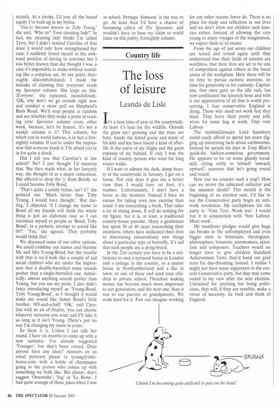The loss of leisure
Leanda de Lisle
It's a lean time of year in the countryside. At least it's lean for the wildlife. Outside the grass isn't growing and the trees are bare. Inside the fatted goose and many of his kith and kin have found a kind of afterlife in the curve of my thighs and the great expanse of my behind. If only I was the kind of country person who went for long winter walks.
III want to admire the dark, damp beauty of the countryside in January, I get on a horse. Not only does it give me a better view than I would have on foot, it's warmer. Unfortunately, I don't have a horse at the moment. Instead I have an excuse for taking even less exercise than usual: I am researching a book. That takes a lot of sitting down. It will do nothing for my figure, but it is, at least, a traditional country-house pastime. Many a gentleman has spent 30 or 40 years researching their ancestors; others have dedicated their lives to discovering extraordinary new things about a particular type of butterfly. It's sad that such people are a dying breed.
In the 21st century you have to be a millionaire to own a terraced house in London and a cottage in the country, or a manor house in Northumberland and a flat in town, or one of these and send your children to private school. Therefore making money has become much more important to our generation, and the next one, than it was to our parents or grandparents. We work hard for it. Few can imagine working for any other reason; fewer do. There is no place for study and reflection in our lives and we don't allow our children such luxuries either. Instead of allowing the very young to enjoy voyages of the imagination, we expect them to sit exams.
From the age of just seven our children are tested and tested again until they understand that their fields of interest are worthless, that their lives are set to be one of competition against others in the banal arena of the workplace. Here there will be no time to pursue esoteric interests, no time for generosity or for curiosity. Capitalism, that once gave us the idle rich, has now confiscated the leisurely hour and with it our appreciation of all that is worth preserving. I fear conservative England is dying. Those who need not work feel they must. They leave their pretty and jolly wives for some hag at work. They vote Labour.
The multimillionaire Lord Sainsbury could easily afford to spend ten years digging up interesting facts about earthworms. Instead he spends his days in Tony Blair's quick-fix, fashion-conscious government. He appears to be on some ghastly treadmill, crying softly to himself 'onward, upward', unaware that he's going round and round.
How can we counter such a trap? How can we revive the educated collector and the amateur sleuth? This month is the beginning of an election year. I'd like to see the Conservative party begin an antiwork revolution. My catchphrase for the party is: 'Vote Tory. Work less'. I would run it in conjunction with 'New Labour. More work'.
My manifesto pledges would give huge tax breaks to the self-employed and even bigger ones to historians, theologians, philosophers, botanists, astronomers, scientists and composers. Teachers would no longer have to give children Standard Achievement Tests; they'd hand out gold stars for day-dreaming instead. I realise I might not have many supporters in the current Conservative party, but they may come round to my view after the next election. Untrained for anything but being politicians, they will, if they are sensible, make a virtue of necessity, lie back and think of England.






























































 Previous page
Previous page